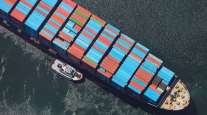Analysts, Economists Differ on Outlook for Transportation, U.S. Growth
This story appears in the Jan. 24 print edition of Transport Topics.
LAS VEGAS — Two industry analysts differed over whether trucking will tread water this year or improve its financial performance even more than it has, and economists told heavy-duty executives the danger of a double-dip recession is gone.
Although mostly bullish on the industry and the U.S. economy, the analysts and economists also cited potential problems such as federal regulations, rising fuel and truck prices, a driver shortage and a stubbornly high unemployment rate.
The comments were made Jan. 17 and 18 here at Heavy Duty Dialogue and Aftermarket Week.
Avondale Partners stock analyst Donald Broughton, known for his work on motor carrier failures, said that “2011 pricing will be strong but not as strong as predicted, and carriers will struggle to maintain margins.” He estimated that truckload rates would improve by well less than 10% this year compared with 2010.
FTR Associates President Eric Starks, who follows truck orders, estimated that by August, truckload rates would be 10% to 15% higher than at the same time in 2010. Starks predicted the industry will face a driver shortage later this year, twice as bad as in 2004.
The new federal Compliance, Safety and Accountability program will make it hard for carriers to maintain driver rosters, Starks said, especially as the improving economy generates more freight. Coupled with the fact that truck sales have been running below replacement level, he said, the utilization rate for tractors in active use should move past 95% and toward 100% during the third quarter.
“That’s a very extraordinary set of circumstances,” he said.
Broughton assembled a similar set of assumptions in a different way. He is more concerned about rising fuel prices and wages for drivers, adding that the fuel costs could accelerate the shift toward truck-rail intermodal, which takes miles driven away from truckers, if not loads.
For the sake of the large, public companies he follows, Broughton said it would be best if the federal government made electronic onboard recorders mandatory for all drivers. The use of EOBRs for keeping driver logs makes it extremely difficult to cheat on hours of service. However, drivers who record their hours manually can cheat.
“The dirty little secret of the industry,” Broughton said, is that sometimes some drivers do cheat on their hours. This creates a disadvantage for more scrupulous carriers at a time when spot market pricing has cooled from a hotter pace during most of 2010. As a result, he said is more optimistic about trucking in 2012 than this year.
For the economy at large, there was also a dispute over monetary policy between William Strauss, senior economist for the Chicago Federal Reserve Bank, and Martin Regalia, chief economist of the U.S. Chamber of Commerce.
Strauss defended his institution’s actions, saying that more fiscal stimulus is unlikely because of congressional concerns about the deficit, but Regalia was skeptical.
“This is a Hail Mary pass by the Fed . . . This is a tightrope walk we’ve never been on before,” Regalia said.
Regalia and Strauss also disagreed on inflation, with Strauss focusing on consumer prices other than food and energy. Core inflation is now slightly less than 1% per year, he said. Regalia preferred to look at oil and other commodity prices, which rose for most of 2010 and concluded that “inflation is picking up.”
They agreed that the economy is not growing fast enough to slash the unemployment rate. The modest economic growth has led to modest job growth that does not even match population growth. Therefore, they said, the rate doesn’t drop much.
Strauss said he agrees with gross domestic product growth forecasts of 3% to 3.5% through 2012, but this growth will “feel better,” he said, because much of the growth last year came from inventory replenishment. The expansion that takes place this year will come through final sales, he said.
Strauss also said manufacturing and industrial production will grow faster than the economy as a whole, and that means trucks will have freight to haul.
Regalia predicted GDP growth of about 3.25% during the first half of the year and 3.75% during the second half. Although pleased with the idea of accelerating growth, he said it is anemic by historical standards of what has happened after recessions.
As for the housing market, Regalia said it is not falling any more, but it is stable at an extraordinarily low level.
“The backlog [of unsold homes] is being worked out, but it could take another year to clean up,” he estimated.




